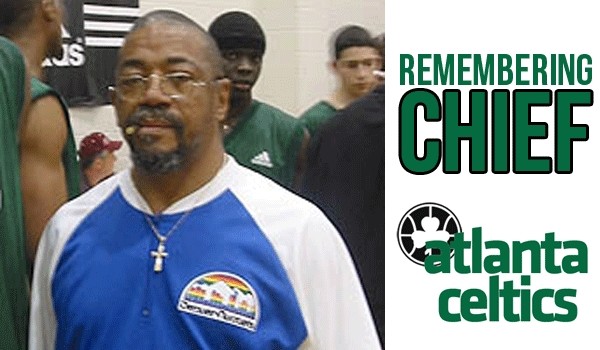Remembering Wallace Prather, Jr.
He stared at me from a distance like a father sizing up a young man that was waiting for a first date with his daughter. I sat alone halfway up the old bleachers at O'Keefe Gym on the campus of Georgia Tech. This was my first foray into Atlanta grassroots basketball.
I was watching future NBA players and they all wore Atlanta Celtics jerseys. Wallace Prather, Jr. coached with a quiet voice from the sidelines but protectively aware of who was watching and where they were.
After his collection of trees bent the rims at the old school gym that borders the downtown Connector in Atlanta, Prather slowly walked over to me, extended his hand and said "I know you aren't here watching your brother. So, who you like the best?"
That was my introduction to the godfather of Atlanta basketball. Wallace Prather knew nothing about me and I knew nothing about him. Yet, in that instance, the beginning of a trust-filled relationship began
That scene played out in similar forms for people all over Georgia and the country, for that matter. In a nutshell, that was Wallace Prather, Jr. He was, after all, the godfather of Georgia grassroots basketball.
WHY THE WALLACE PRATHER MEMORIAL?
I asked a player a couple of weeks ago if he and his team were playing at the WPM. He asked me in all seriousness "Who is Wallace Prather?". The question stopped me in my tracks.
Who is he? Who is he? Are we that old? Has he been gone that long? It has been eight years since Prather passed of a sudden heart attack on June 17, 2005.
Current Atlanta Celtics president Karl McCray knew he wanted to honor his long-time brother-in-hoops with, what else, a tournament that celebrated basketball in Georgia and the Southeast. The plan was to reinvent the Atlanta Basketball Classic, a staple on the travel circuit since 1987, with the Wallace Prather Memorial in 2006.
The decision was an easy one.
"We do it in memory of him," McCray said by phone this week. "He was such a giant in grassroots basketball. We wanted to make sure that people never forgot his name."
THE HISTORY
In 1973, McCray was a part-time recreational leader for the city of Atlanta. He was was asked to appoint someone to spearhead the grassroots basketball programming in the early 1980s. Prather, who came to the park and recreation department from AT&T, was that person.
Both were young fathers, eager to help their children start in youth sports. McCray worked closely with Prather and saw the potential he had in connecting all walks of life. The decision was easy to hand the basketball responsibilities over.
The city of Atlanta funded the Atlanta Celtics to get started and did so until 1996.
"That's when our program actually took off," McCray said. "Wallace didn't have to just get kids from the city of Atlanta. He started to branch out all over the state."
That's when the likes of Dwight Howard, Josh Smith, Amare' Stoudemire, Derrick Favors, Joe Johnson, DeSagana Diop, Travis Outlaw, Randolph Morris, Javaris Crittenton, Howard Thompkins and others came on board and wore the Celtics jerseys.
"For the state of Georgia, he was one of the ground breakers. He made things relevant around here for basketball. This whole area was always a football area," Hulio Smith, the current general manager of hte Celtics, said. "When Wallace first came along, he kind of revolutionized basketball here."
HI, I'M SONNY
Prather was in Las Vegas with his budding Celtics program in the early 1990s, bumping around the desert in an 18-passenger van and taking his team of Atlantans around the circuit.
While in Sin City, he met a man they called Sonny, the most powerful man in youth basketball. Sonny Vaccaro signed Michael Jordan to Nike and ushered in a new era of grassroots basketball.
Vacarro was the person to know in hoops at the time and Prather forged a quick relationship with the adidas czar.
"Sonny told Wallace that if we signed with adidas then we would never want for product," McCray said. "That has remained true even to this day."
But when Vacarro left adidas for Reebok, the future of the Celtics and the entire three stripes grassroots program was up in the air. That's when Prather stepped in.
"He sat down with adidas and convinced them to stay in grassroots basketball," McCray said. "adidas was considering pulling out until he sat down with them and told them what they had. He was incredible in the way he worked that."
Seattle Rotary, Playaz, DC Assault, Pump 'N Run, EBO, Atlanta Celtics and Indiana Elite all signed on with adidas, keeping the program alive and healthy.
"Everyone was thinking about leaving adidas and leaving with Sonny (to Reebok). Wallace thought outside of the box and asked 'Why leave?" He told everyone to just hang in there."
The Celtics did. The adidas brand stuck with grassroots hoops. And the Celtics continued on.
OUT OF NOWHERE
My relationship with Prather grew into a strong one over the years. We'd oftentimes ride together to rural towns to watch players. His purpose was to land a young hooper for the Celtics. I was on the road looking for talent with my job at Rivals.com.
Road trips together were common.
I asked him if he wanted to ride together to Tallahassee, Florida for the Big Bend Shootout, a regional grassroots tournament held at Florida State University.
"I think I'm going to stay home this time, chief," he told me over the phone the day before the event.
That was an odd move. Prather never missed an event. I called him on a Friday night around 10:30 after the first day of action. We chatted about his teams and ended the conversation quickly.
The story took a turn that no one expected the next morning. I filed this report that day:
The Big Bend Shootout had a somber mood on Saturday as the day started with the news of the passing of Wallace Prather, one of the most well-respected men in AAU basketball. The Atlanta Celtics general manager's passing put a quiet spell on the day's events. As Prather would have wanted, the games went on and some of the top players in the country did what they do best.
Atlanta Celtics, AAU basketball lose father figure
Hulio Smith, the coach of the Atlanta Celtics 17 and under team, knew something had to be wrong when he saw he had 30 missed calls after the Celtics' 8:30 a.m. game on Saturday morning.
The news he received was the news he never wanted to hear. His friend and mentor Wallace Prather died early Saturday morning of a heart attack at his home in Atlanta.
As the godfather of Atlanta basketball, Prather and Celtics president Karl McCray built the adidas-sponsored program into one of the most well-respected and most-recognized AAU teams in the country.
Starting the organization in 1990, the Celtics have sent hundreds of kids to college on basketball scholarships and most recently saw alums Dwight Howard and Josh Smith taken in the NBA lottery in 2004.
Whether his players went to a small junior college in the Midwest, or to some of the nation's elite basketball programs across the country, Prather made sure he attended each player's high school games. The little things go unnoticed and as mourners gather for his funeral, the stories will certainly come out of the woodwork.
News of Prather's passing moved quickly through the basketball community, shocking those that knew him. After the numbness wore off, those that knew him all said the same things.
"If it weren't for Wallace Prather, I wouldn't be coaching." "If it weren't for Coach Prather, I wouldn't have been a college graduate." "If it weren't for Wallace Prather, our AAU program would never exist."
The compliments will always flow for the soft-spoken, laid-back hoops fanatic. They always will. He will be missed.
Rest in peace, chief.
A LASTING IMPRESSION
Prather's funeral felt like a NABC coaches convention. Everyone was there. From national powerhouse to coaches from schools that would celebrate a 500 people coming to their games, the mourners came from every walk of life.
Talk to anyone and they will tell you Prather's best gift was his ability to shoot straight with players and coaches.
"The best interest of the young man was always put first, let me tell you that," Former Georgia Tech and current George Mason head coach Paul Hewitt said. "I tell people all the time about his dedication about education all you had to do was look at his son and where he went to school."
Wallace Prather, III went to Cornell. He graduated from the Ivy League school and is currently a certified sports agent.
"I don't think young Wallace was that interested in going to Cornell but there was no two ways about it. That Ivy League education was the best he was going to get," Hewitt said. "Big Wallace always understood that. That was the right decision."
McCray echoed Hewitt's opinion.
"(Wallace) would tell kids to go to a place where you could get a degree to feed your family," McCray said. "A lot of kids dream big and that's okay but they aren't realistic. I think that's the biggest problem with the game today. But he'd tell them to be honest with themselves and focus on that degree first. That was important to him."
Part of understanding the end result was understanding the player at the core. Smith, who was Prather's understudy for years, said that was the defining trait of his mentor.
"Wallace had a gift. He had an eye for talent. He could look at a kid and see the player he was going to be down the road. He'd look at a kid and know if he was 'the one'. Nobody else could see it at the time and it always seems like it came true," Smith said. "That was his gift."
WHY THE WPM?
This weekend's tournament named in his honor is a symbol of the kind of person Prather was. He was a connector and a unifier. The WPM field is Georgia-heavy. Every team that is any team will be there, minus the Nike EYBL teams Georgia Stars and Southern Stampede.
The weekend, hopefully, will be a celebration of basketball in the Peach State.
Wallace would have liked that.





